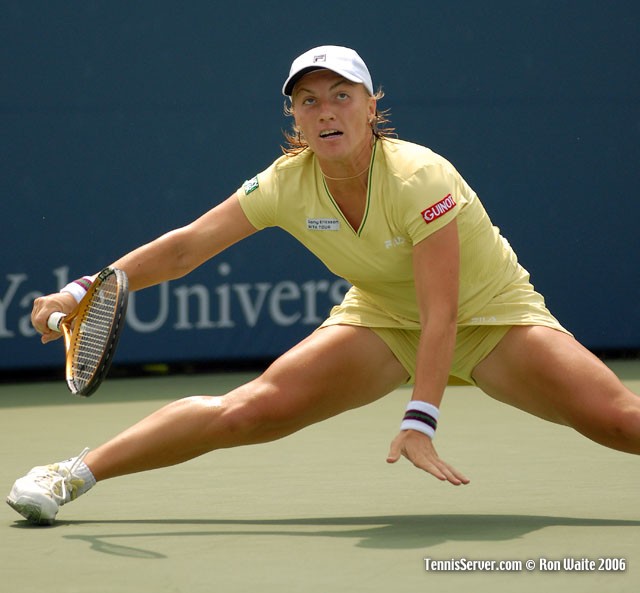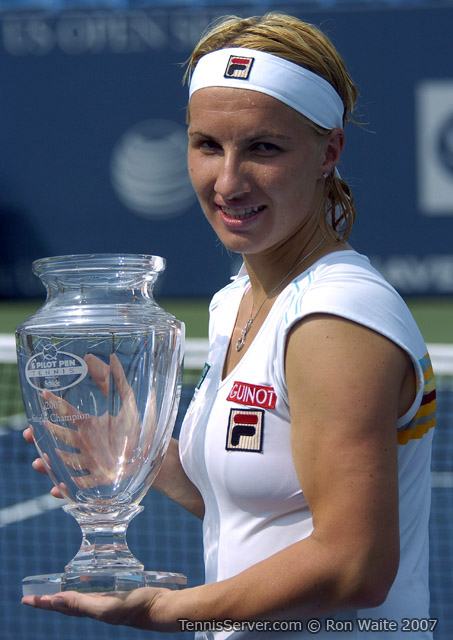Svetlana Kuznetsova, "Sveta" as we call her, arrived at the Sanchez-Casal Academy in Barcelona in 1999. She was about 14 years old. Her mother, Galina Tsareva, was an Olympic cycling champion and her father, Alexandr Kuznetsov, a cycling coach who was conducting preseason training in a city nearby, about 100 kilometers away.
But Svetlana wanted to take a different path: she wanted to become a tennis player.
The first time we met Sveta, our staff at the Sanchez-Casal Academy shared a common reaction: she was so shy she would not look at you, she had no confidence in herself, but every time she hit the ball the noise it made was scary. It was something we had not seen or heard before from a girl, maybe slightly similar to Andy Roddick. She reminded us a little bit of Arantxa (Sanchez Vicario) when was little — an incredible talent — but with strokes we had not seen from junior girls her age before.
We had a staff meeting and decided that we would help her. At that time we just started the Academy and didn’t have many players at Sveta's level.
She felt very relaxed because we decided at the very beginning to establish a very simple goal: to train Sveta to become the best player possible; an all-court player who didn't have to win from the first day. I think she appreciated and valued this approach because in Russia, Sveta was always under intense pressure. We believe our approach helped improve her confidence as Sveta saw she was winning matches because she was a better player, not because she was pressured to win.
Less than two years later, she was already the No. 1 junior in the world at the age of 16. We tried to convince the Spanish Tennis Federation to help her become a Spanish citizen, but they didn’t believe the potential that we saw in her. The Federation's president at that time said: "She’s a mediocre player who never will be in the top 20. We have people offering players like this to us every month." Yet today, after Arantxa's retirement and Conchita (Martinez) in the final phase of her career, Spain is in deep trouble in its efforts to produce top female players.
At the age of 17, Sveta began traveling with Arantxa and her team of coaches from the Academy. That year she won her first professional event in singles and three doubles tournaments together with Arantxa. Playing and training with Arantxa taught Sveta discipline, strategy and how to be a true professional. Arantxa opened the first door for her and helped mentor her. At that time, Arantxa was Martina Navratilova's partner. Martina was also training in our traveling group. Once Arantxa retired at the end of the year, Martina, who is smart and knows talent, talked Sveta into playing with her. In 2003 they won four titles and played the year-end WTA Tour Championships. Martina taught her how to play inside the court. She opened the second door for Sveta.
When two former No. 1 players — Arantxa and Martina — recorded some of their best recent doubles results playing with a rookie, it proved to many that Sveta had talent. Sveta's confirmation as a top singles player came the same year as she advanced to the Wimbledon quarterfinals and finished in the top 30. Stephan, her personal coach from the Academy, traveled with her for those two years, which were the most difficult ones. Giselle, the academy's physical coach did a great job improving her mobility, which was one of her weaknesses. Both coaches stayed with Martina when she decided to play with Lisa Raymond and go for the Olympics in 2004. Sveta was very disappointed and was ready to quit playing doubles.
Svetlana Kuznetsova
Svetlana Kuznetsova
Svetlana Kuznetsova
Svetlana Kuznetsova
Svetlana Kuznetsova
Svetlana Kuznetsova
Svetlana Kuznetsova
Svetlana Kuznetsova
Svetlana Kuznetsova








No comments:
Post a Comment